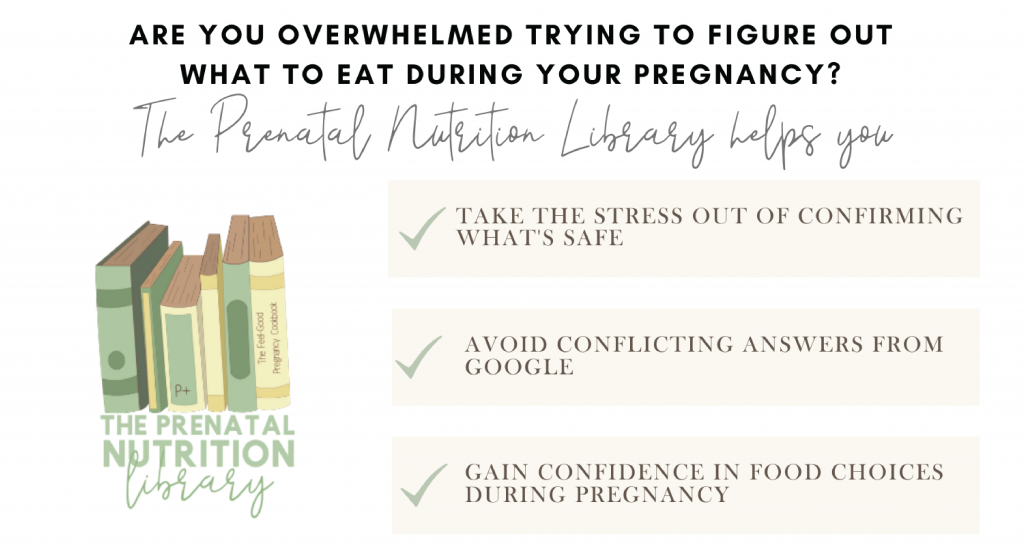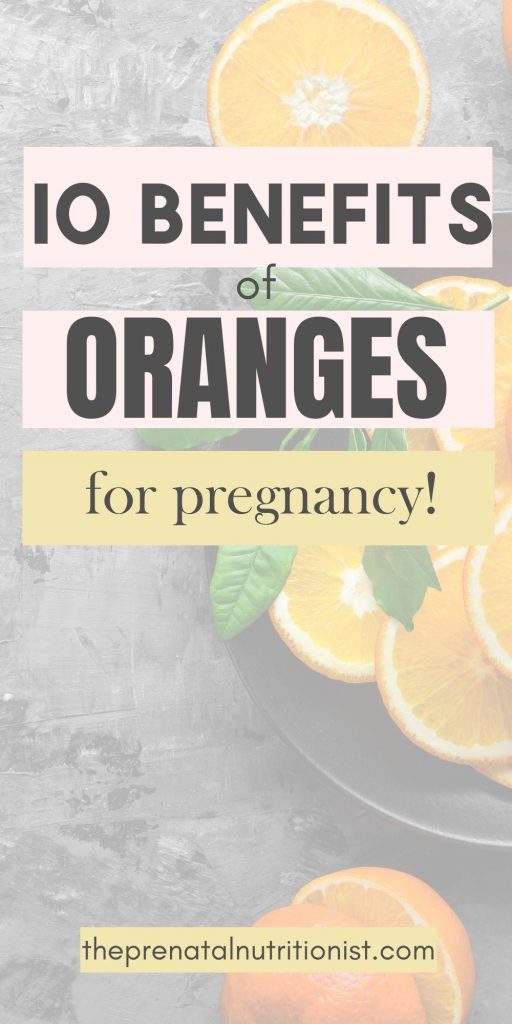
Making healthy food choices during pregnancy is one key to a happy and healthy nine months. A healthy diet consists of plenty of fruits, veggies, whole grains, quality proteins, healthy fats, and more.
Today, we’re going to focus on a certain fruit that is particularly beneficial to eat during pregnancy: oranges!
Oranges have so many benefits during pregnancy and are dietitian approved. They are chock full of vitamins, minerals, and other nutrients required for the healthy growth and development of baby. Plus, they benefit expecting mothers in a variety of ways as well. Not to mention oranges are a great dessert option when you’re craving something sweet. If you have questions about the safety or benefits of other fruit during pregnancy such as dates, pineapples, grapes and MORE, check out The Prenatal Nutrition Library. We answer all your questions and provide evidence-based information to give you the facts behind fruits, foods, and prenatal vitamins to name a few. For 50% off your first month use code 50off at checkout!
Have you ever tried chocolate covered oranges?!
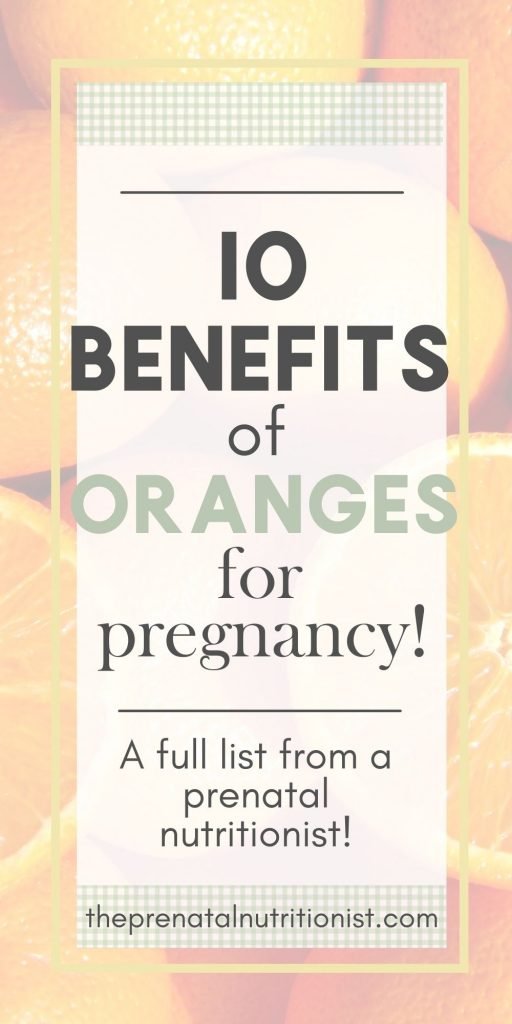
Let’s go over all the reasons why you should add this citrus fruit to your pregnancy diet today!
10 Benefits Of Oranges During Pregnancy
Promotes fertility.
Oranges are a rich source of folate. This nutrient is known to increase female fertility in those using reproductive assistance technology, prevent early birth defects, and reduce the risk of miscarriage. One large orange contains about 35 micrograms (mcg) of folate or about 9% of the recommended daily value for a woman trying to conceive (which is 400 mcg DFE per day and increases to 600 mcg DFE per day when pregnant).
Promotes formation of baby’s neural tube.
Another reason that folate is particularly important during pregnancy is that it promotes the proper development of baby’s neural tube. Improper neural tube development can lead to brain and spinal cord defects, such as anencephaly and spina bifida. Since the neural tube forms in the first trimester, eating oranges and other folate-rich foods in the first few months of your pregnancy is especially beneficial.
Promotes development of baby’s brain & bones.
Oranges contain folate, potassium, calcium, vitamins C, and fiber. All of which contribute to the healthy growth and development of your baby’s brain, bones, and spinal cord. So many wins!
Replenishes the body.
Morning sickness can cause vomiting that rids the body of essential vitamins and minerals. Oranges are nutrient-dense, making them a good source of electrolytes to replenish the body after vomiting and/or after a cold or illness. Plus, many women find oranges to be a great go-to snack when feeling nauseous or dealing with food aversions during pregnancy.
Helps you stay hydrated.
Staying hydrated during pregnancy is a must. And one of the best ways to supplement your daily water intake is to eat hydrating fruits and vegetables. The water content in oranges is huge! Oranges are about 80-89% water, making them a great and refreshing option for hydration. Other fruits and veggies with high water content include watermelons, cantaloupe, apples, lettuce, and spinach.
Strengthens the immune system.
Oranges are rich in vitamin C, which plays a large role in the proper functioning of your immune system. Vitamin C helps your body ward off colds and illnesses. Just one large orange contains 97 milligrams (mg) of vitamin C or over 100% of the recommended daily value for pregnant women. For more on strengthening your immune system during pregnancy, click here.
Reduces stress.
Vitamin C is also known to help reduce our body’s stress hormones. It’s important to note it does NOT get rid of prenatal stress but may positively impact our body’s physiological response to stress. Pregnancy takes a toll on the body, both physically and mentally. Consuming plenty of vitamin C-rich foods like oranges, bell peppers, strawberries, and tomatoes may be one factor that helps.
Helps to reduce the risk of anemia.
Anemia during pregnancy can be caused by a deficiency in iron, folate, or vitamin B12. As mentioned above, oranges are a good source of folate. Plus, oranges also contain vitamin C, which is an essential vitamin that is helpful in the proper absorption of iron. It makes a great pairing with iron-rich foods. This makes eating oranges a good natural remedy for reducing the risk of anemia and other pregnancy complications.
May help control blood pressure levels.
Eating oranges may also help you to keep those blood pressure levels under control, which is important to reduce the risk of complications during pregnancy. The vitamin C, flavonoids, and potassium found in oranges all play a role in lowering blood pressure. Potassium is one superstar nutrient in blood pressure regulation.
Helps fight constipation.
Oranges are a good source of dietary fiber, pectin, and naringenin. All of which are known to be helpful in the prevention of upset stomach and constipation. One large orange contains about 3 grams of dietary fiber to help expecting mothers meet the recommended daily value of at least 30 grams per day.
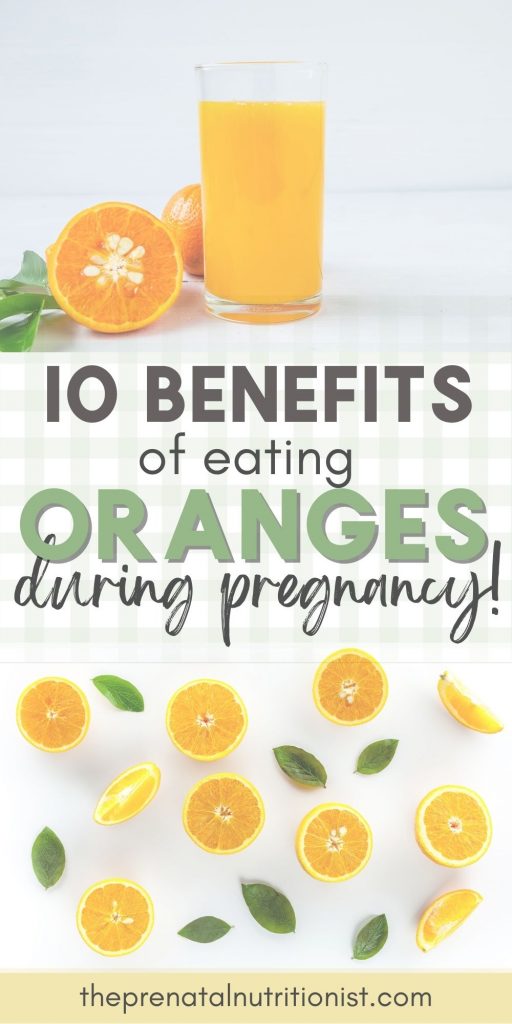
Add oranges to your pregnancy shopping list today to start taking advantage of all these great health benefits.
From nutrients that are important in the prevention of neural tube defects to replenishing the body after morning sickness, oranges are a great fruit choice when it comes to maintaining a healthy pregnancy diet. If you don’t like oranges, that’s okay too!
There is no ONE food that will make or break your pregnancy diet, and there are plenty of other great fruit and food choices for pregnancy too. Learn all about healthy food choices for pregnancy inside The Prenatal Nutrition Library (use code 50off for an exclusive offer!)
And, before we go, we can’t forget to talk about orange juice during pregnancy. It is safe to incorporate fruit juice during pregnancy, like orange juice, but be sure to practice moderation, as this gets rid of the fiber which we need. This is why we encourage choosing mostly whole fruits versus fruit juice.
By choosing the whole fruit versus the juice, you will get more fiber, feel more full + satisfied, and it is more blood sugar friendly. If you choose to drink fruit juice, remember moderation, and choose a fruit juice free from added sugars.
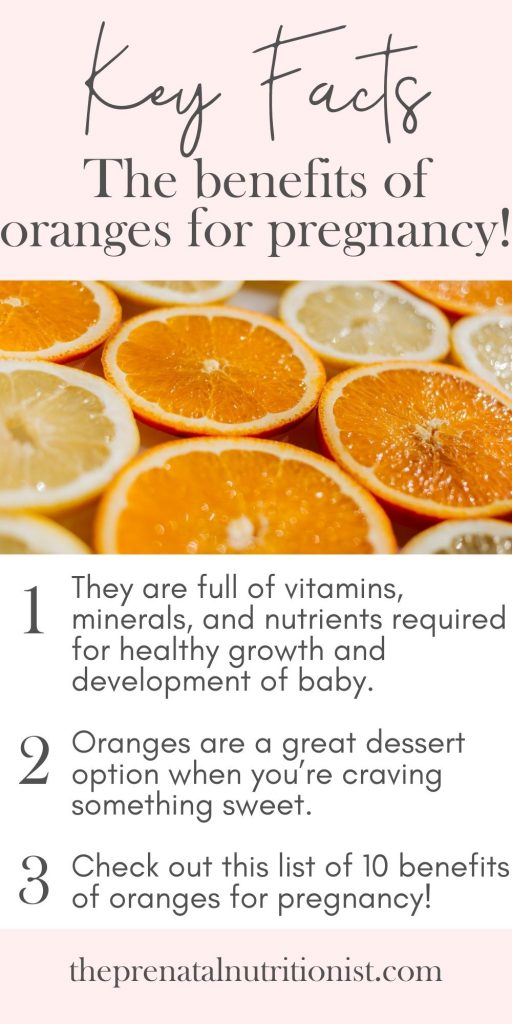
For more blogs on all things prenatal nutrition, head on over to The Prenatal Nutritionist Blog. And, don’t forget to check out The Prenatal Nutrition Library. No more conflicting Google answers– hallelujah! The Prenatal Nutrition Library is your home for the answers to all your frequently asked pregnancy nutrition questions, delicious & healthy trimester meal plans, and more!
